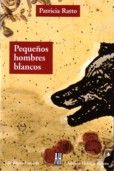
| 02 de Junio de 2009 | The Latin American Review of Books 2009 | |
| Reseña de "Pequeños hombres blancos" | |
|
 |
Suspicion impregnates every line of Pequeños hombres blancos, Patricia Ratto’s debut novel about life under the Argentine dictatorship
Pequeños hombres blancos
Patricia Ratto
Adriana Hidalgo, 2006
188 pages
Reviewed by Gavin O’Toole
IT IS SAID that for terror to be an effective tool of dictators, it use must remain arbitrary: any predictability, any divergence from a random pattern, allows the subject population to develop strategies of evasion, even resistance.
By far the best soil in which to nourish a regime founded upon terror, then, is that of the mundane, provincial town where the weaker tyranny of everyday routine already reigns. Unpredictability yields its best fruit in the colourless land of the tedious. And the atmosphere of fear so engendered in such a place hangs like heavy clouds that endlessly threaten a nightmarish storm, but have yet to burst.
Patricia Ratto’s Pequeños hombres blancos is a remarkable journey into this climate of oppression in which dramatic actions or declarations have given way to a silent, disturbing tension.
Landscape of fear
Gabriela, a schoolteacher, arrives in small-town Patagonia from urban Buenos Aires during the era of Argentina’s most violent dictatorship. She is neither rebel nor saint, just an ordinary, apolitical person whose intention is to teach mathematics. The protagonist progresses through a series of seemingly trivial, routine episodes in which she seeks to adapt to local conventions, climate, and loneliness.
The dictatorship is only revealed in its mundane guise, an ever-present shadow barely glimpsed through the local law whose effect on the population, nonetheless, is all-encompassing, ensuring that the entire town - the whole population - is imprisoned in this landscape of fear.
This is a story about suspicion and contradiction, full of symbols and suspense, in which the reader remains more well-informed, complicit, than the characters themselves. It evokes with great skill the atmosphere that must have prevailed in the Argentina of the generals.
Pequeños hombres blancos was Ratto’s first novel in which she recounts, obliquely, her own experience as a secondary school teacher in the inhospitable Chubut province - that area of Patagonia in which most Welsh-speakers can still be found.
She has achieved something noteworthy: evoking silence through a use of language impregnated with the threat of violence in which what is not said, what is purposefully hidden, reveals more than what is.
Gavin O’Toole is the editor of the Latin American Review of Books

